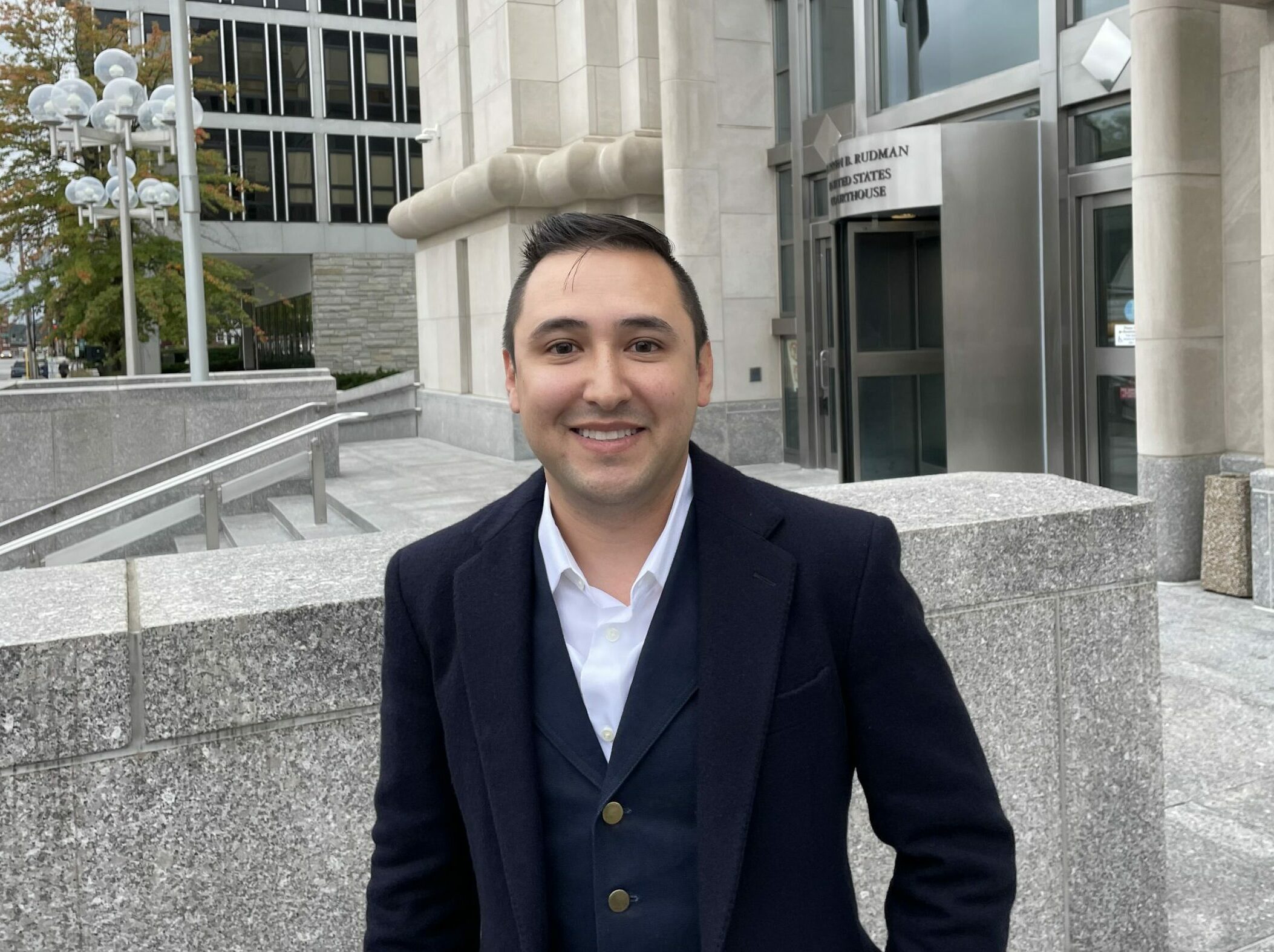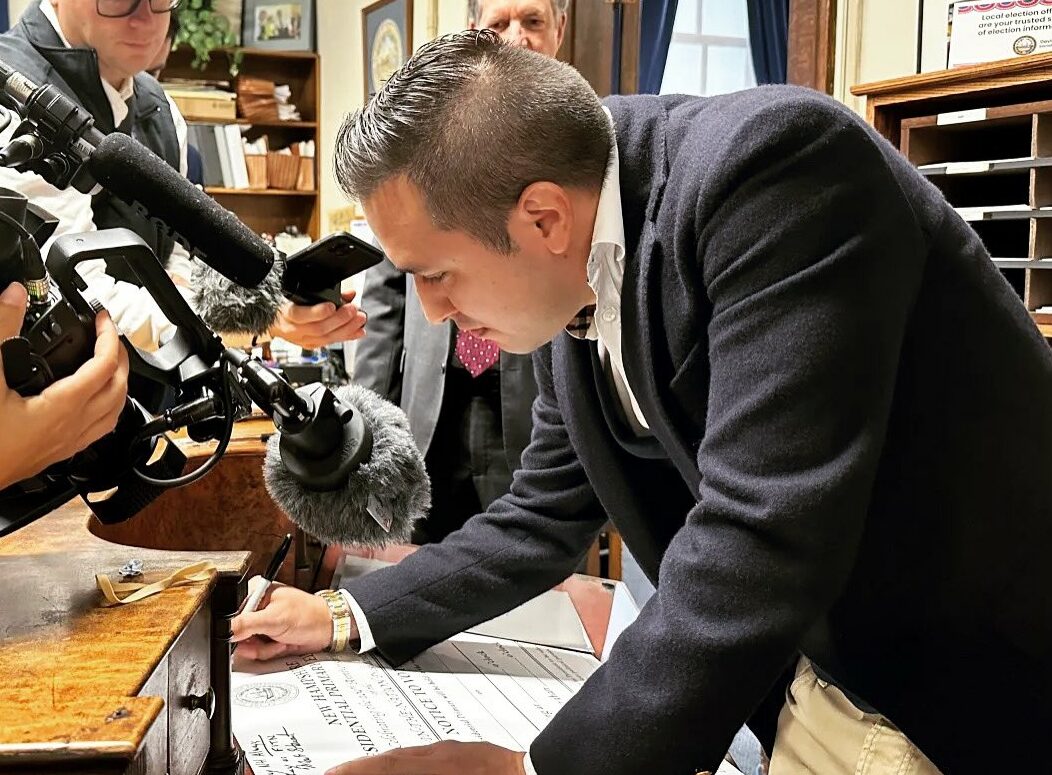Longshot GOP Candidate Tries (Again) To Get Trump Bumped From FITN Ballot

Ballots for the First in the Nation presidential primary have been printed, so it’s all but certain Donald Trump’s name will be listed. But that’s not stopping one last, longshot attempt to dump Trump, a legal challenge that hinges on the brunch-loving brother-in-law of a Texas tax attorney.
The tax attorney is John Castro, whose name will also be on the GOP First in the Nation primary ballot. He’s also going to court to try to kick Trump off it.
Castro’s novel legal theory is that as a GOP challenger to Trump, he can show that he’s being harmed by the former president’s allegedly illegal appearance on the ballot. He says Trump is siphoning support and donations that could otherwise go to him. Castro says Trump can’t appear on the ballot because he’s guilty of “insurrection,” and it’s the duty of New Hampshire state officials to remove him under the 14th Amendment.
That’s the same argument used by Colorado’s Supreme Court and Maine’s Secretary of State when they declared Trump ineligible to appear on the ballot in their states. The U.S. Supreme Court is expected to review those decisions soon.
Castro first made his claim last October. His case was dismissed after U.S. District Judge Joseph LaPlante ruled, in part, that a presidential campaign that managed to raise just $670 was not a serious candidacy. Castro appealed to the First Circuit Court, which sided with LaPlante, but left a crack open for Castro to try again.
“We conclude that for Castro to show that he was a ‘direct and current competitor’ at the time he filed his complaint, he must show, at the very least, that at that time he was ‘competing’ with the former President and that he was doing so in the 2024 New Hampshire Republican presidential primary itself,” the First Circuit ruled in November.
Castro filed a new lawsuit last month, claiming he can now prove he’s a real candidate. With a little help from his family.
David Garza is Castro’s personal assistant and one of only two identified campaign volunteers supporting the Castro 2024 effort. He’s also Castro’s brother-in-law.
Garza testified before U.S. District Court Judge Samantha Elliott on Wednesday that he and his cousin, Alexander Gomez, flew to New Hampshire the day after LaPlante’s ruling to get serious about the campaign. (Gomez is also an employee of Castro’s tax business.)
The pair flew to Manchester on Oct. 27, drove to Concord, checked into their hotel, got some dinner, watched some baseball, and planned out their big day to follow before turning out the lights.
The next day, armed with about 30 Castro campaign yard signs, the pair drove south to a New Hampshire city Garza called “Noshua.” That conflicted with the testimony of Gomez, who testified he thought the city was called “Joshua.”
Whatever the city, they picked a residential street at random and got down to the hard work of campaigning for president. Garza and Gomez knocked on between 10 to 12 doors to ask if they could put up Castro signs. After getting 10 to 12 rejections, they decided to start putting the signs up on vacant lots somewhere between Joshua (or Noshua) and Manchester, Garza testified.
Elliott halted the proceedings and stopped Garza’s testimony when it became clear he may not have sought permission from the owners of the vacant lots, possibly violating New Hampshire election law.
After posting between 12 to 15 lawn signs in legally dubious locations, the pair went to brunch, did some antiquing, and then headed back to their hotel to watch more baseball. That evening, the cousins went to a Halloween festival in Concord. Asked if they used the festival as an opportunity to campaign for Castro, Garza said they were off the clock.
“We were very tired at the time, and we just wanted to be ourselves,” Garza testified.
The pair claimed they also spent a day on the campaign trail in Arizona in early November but only managed to put up about five signs due to the hard desert ground, they testified.
As for the candidate himself, Castrol told the court that, while he cannot identify a single New Hampshire voter who is supporting him for president in the primary, he has spoken to some. And, he argued, because his social media campaign has reached thousands of people in the Granite State, the laws of statistical probability indicated he must have certainly reached at least one Republican voter at this point in his campaign.
Castro has dozens of lawsuits filed across the country trying to boot Trump from state ballots, and he’s repeatedly said his presidential campaign is simply part of his anti-Trump legal strategy. But on Wednesday, he told the court he should be treated as a viable candidate. Now that that former Vice President Mike Pence and South Carolina Sen. Tim Scott have dropped out of the race, Castro says he has a real chance.
Castro’s campaign raised nearly $800 in donations for all of 2023, though nothing from any New Hampshire resident.
Elliott is expected to rule on the case in the coming days.




